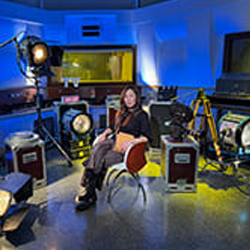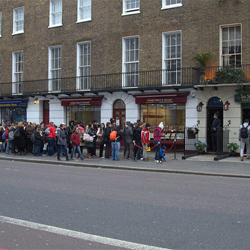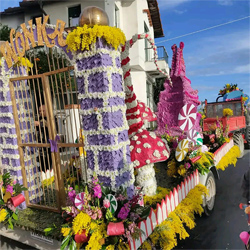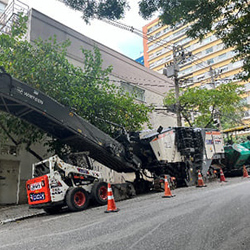As I wrote about in a previous post, when you discover you’re pregnant, you first go meet with a doctor called a GP, or general practitioner. You talk with them about the likelihood of your being pregnant, and can request a urinalysis if you’ve already taken a home pregnancy test (the home tests are pretty accurate, so typically they don’t test you again). They then shower you with endless congratulations (lol), give you a written introduction to the maternity ward… just kidding. All they do is tell you how to get yourself registered and explain the procedure for your future doctor visits.

This is the container that the GP gave me for my urinalysis. It might be OK for a man, but I’m pretty sure a woman’s not going to be able to aim at this too well (lol)
Apparently, there are just three hospitals with a maternity ward in Dublin. I picked the one that was most convenient to my house, and registered as a patient through their website. A few days later, I got a packet of materials from them in the mail with the date and time of my first appointment (at 12 weeks). In my case, I had gone to the GP at seven weeks, so I was worried about having to wait five weeks during the initial high-risk period. I was told it would be better to find out whether I was having a normal pregnancy, so I decided to have a voluntary first-trimester echo and DNA test, which you can do if you pay out of pocket.
I said “if you pay out of pocket,” because pregnancy-related doctor’s visits and births are typically free in Ireland. I have criticized the social system at every opportunity here (lol), but the social insurance is awesome!! That said, the three hospitals with maternity wards I mentioned earlier fall into three different categories: private, semi-private, and public. The private ward is more convenient (you always see the same doctor and get seen frequently, for example), but it costs a lot of money. Most people go to the public ward, and everything there is free. Thinking I needed to make the most of the taxes I’ve paid(lol), I decided on the public one.
That said, the first-trimester echo and DNA test I mentioned were not essential tests, so I had to pay for them out of pocket if I wanted to get them done. The echo confirmed an intrauterine pregnancy, and at around ten weeks I had them take my blood to make sure there were no abnormalities in the fetal DNA. According to my Japanese friend, the tests here are somehow more advanced, so they’re relatively simple and you get the results faster. At around the 12th week, we were able to learn that there were no outstanding abnormalities and determine the gender based on the chromosomes. Incidentally, there are many people in Ireland who don’t want to know the gender of their baby until it’s born, preferring it to be a surprise.
At the public hospital, you don’t get seen very often until later in your pregnancy, which leaves about two months of no visits between the 12th and 20th week—which I think is pretty infrequent compared to Japan. It’s also really common here for people to take supplements, so they tell you to take all kinds of things even while you’re pregnant. In addition to the folic acid you always hear about in Japan, they strongly recommend that you take vitamin D (which makes total sense because of how few hours of daylight there are here), a multivitamin, omega-3, and an iron supplement starting midway through your pregnancy. I’m not sure that all that is really necessary, but I figured I might as well take them if they’re for the development of the baby.

These poisonous-looking pills are iron supplements. The fact that they’re not even all turned the same way just seems so un-Japanese (lol)
This post is getting long, so I’ll stop here for now. Stay tuned for the next installment on the latter part of my pregnancy in Ireland!



























































